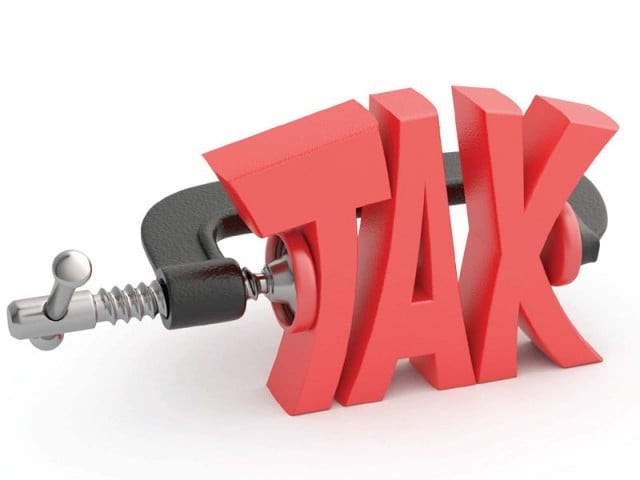Changing tax laws: Transgressing powers of parliament
Government has been amending laws using platform of ECC

Government has been amending laws using platform of ECC. PHOTO: FILE
For last couple of years, it has been amending the tax laws by using the platform of Economic Coordination Committee (ECC) of the Cabinet.
It has also got powers of setting salaries of the Members of parliament, Chairman Senate and Speaker National Assembly through official gazette notification. Earlier, salaries of parliamentarians and their heads could only be increased by amending the relevant laws.
Lately, the government has given the authority to determine the market valuation of the properties to Federal Board of Revenue (FBR) and violated a ruling of the Supreme Court of Pakistan in addition to compromising the supremacy of the Constitution.
This trend is contrary to the spirit of the democracy and brings in question the Article 77 of the Constitution that states, “No Tax shall be levied for the purpose of the Federation except by or under the authority of Act of Majlis-e-Shoora (Parliament).”
Money Bill
However, on back of its majority in the National Assembly, the government has obtained vast powers, which were earlier the domain of the parliament. It has also been denying the constitutional right to vote to the Senate by recently declaring some laws as Money Bill, which were actually not Money Bills. For instance, the Fiscal Responsibility and Debt Limitation Act of 2005 has been amended as Money Bill.
In case of Money Bill, the Senate does not have a right to vote.
Reversal of power
The Machiavellian style of governance has also reversed some of the gains of the International Monetary Fund programme. Under the IMF condition, the government had returned the powers of changing the tax laws through Statutory Regulatory Orders (SROs) to the Parliament. However, it has now cleverly taken back these powers.
It has introduced a clause in all the tax laws that state that, “The Federal Government may, from time to time, pursuant to the approval of the Economic Coordination Committee of Cabinet, whenever circumstances exist to take immediate action for the purposes of national security, natural disaster, national food security in emergency situations, protection of national economic interests in situations arising out of abnormal fluctuation in international commodity prices, removal of anomalies in taxes, development of backward areas, implementation of bilateral and multilateral agreements or granting an exemption from any tax imposed under this Ordinance including a reduction in the rate of tax imposed under this Ordinance or a reduction in tax liability under this Ordinance or an exemption from then operation of any provision of this Ordinance to any international financial institution or foreign government-owned financial institution operating under an agreement, memorandum of understanding or any other arrangement with the Government of Pakistan by notification in the official Gazette, make such amendment in” tax laws.
Now the government has started abusing these powers. It has been using the ECC forum to make changes in withholding tax rates on banking transactions. The parliament had approved 0.6% withholding tax rate but through ECC the government is maintaining it at 0.4%.
In ECC, most decisions are not taken with the consensus of the members. There is hardly any ECC meeting when all the members are present.
Finance Minister Ishaq Dar has recently termed the powers to change withholding tax rates on banking transactions through ECC “a sword in his hands”.
Increase in salaries
The government has subtly amended four Acts of Parliament that govern salaries and allowances of Chairman Senate, Speaker National Assembly and their deputies, federal ministers and members of Parliament to increase their salaries through executive orders.
The government amended these four laws through Finance Act 2016, although the relevant clauses were not part of the Finance Bill 2016 that the government tabled in the National Assembly on June 3.
Through these amendments, the government has taken away the parliament’s right to determine the salaries of the Chairman Senate, Speaker National Assembly, Members of the Parliament and the federal ministers.
Now the increase in salaries will be implemented through notifications in the official gazette – a move that is aimed at avoiding media criticism. Earlier, the salaries, allowances and perks were explicitly mentioned in these laws.
Property valuation
The latest episode of determining the property valuations for taxation purposes by the FBR has further deepened concerns that the move to grab the parliament’s powers is unending.
Such vast powers are not only against a decision of the Supreme Court of Pakistan but may also undermine transparency, according to independent legal experts. The decision to grant the FBR such powers is also against the spirit of withdrawing the FBR’s powers of issuing Statutory Regulatory Orders to change the tax rates.
The writer is a staff correspondent
Published in The Express Tribune, August 8th, 2016.
Like Business on Facebook, follow @TribuneBiz on Twitter to stay informed and join in the conversation.



















COMMENTS
Comments are moderated and generally will be posted if they are on-topic and not abusive.
For more information, please see our Comments FAQ